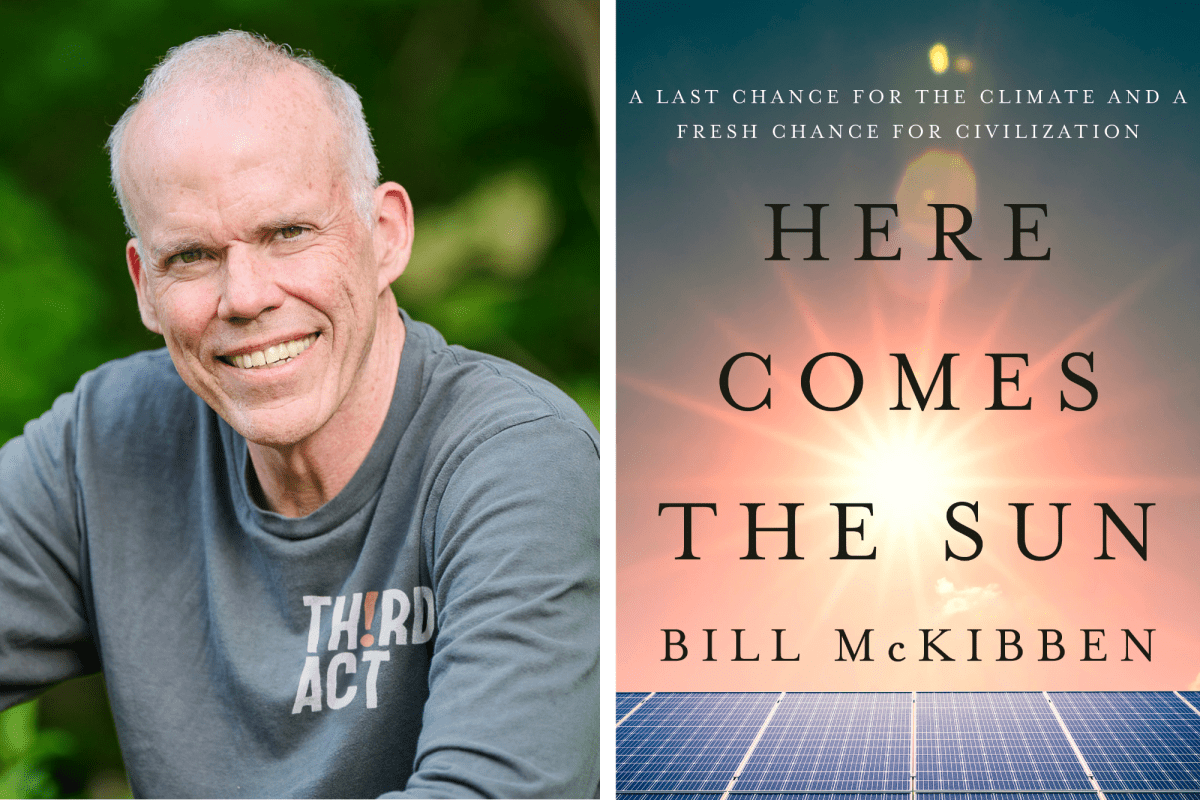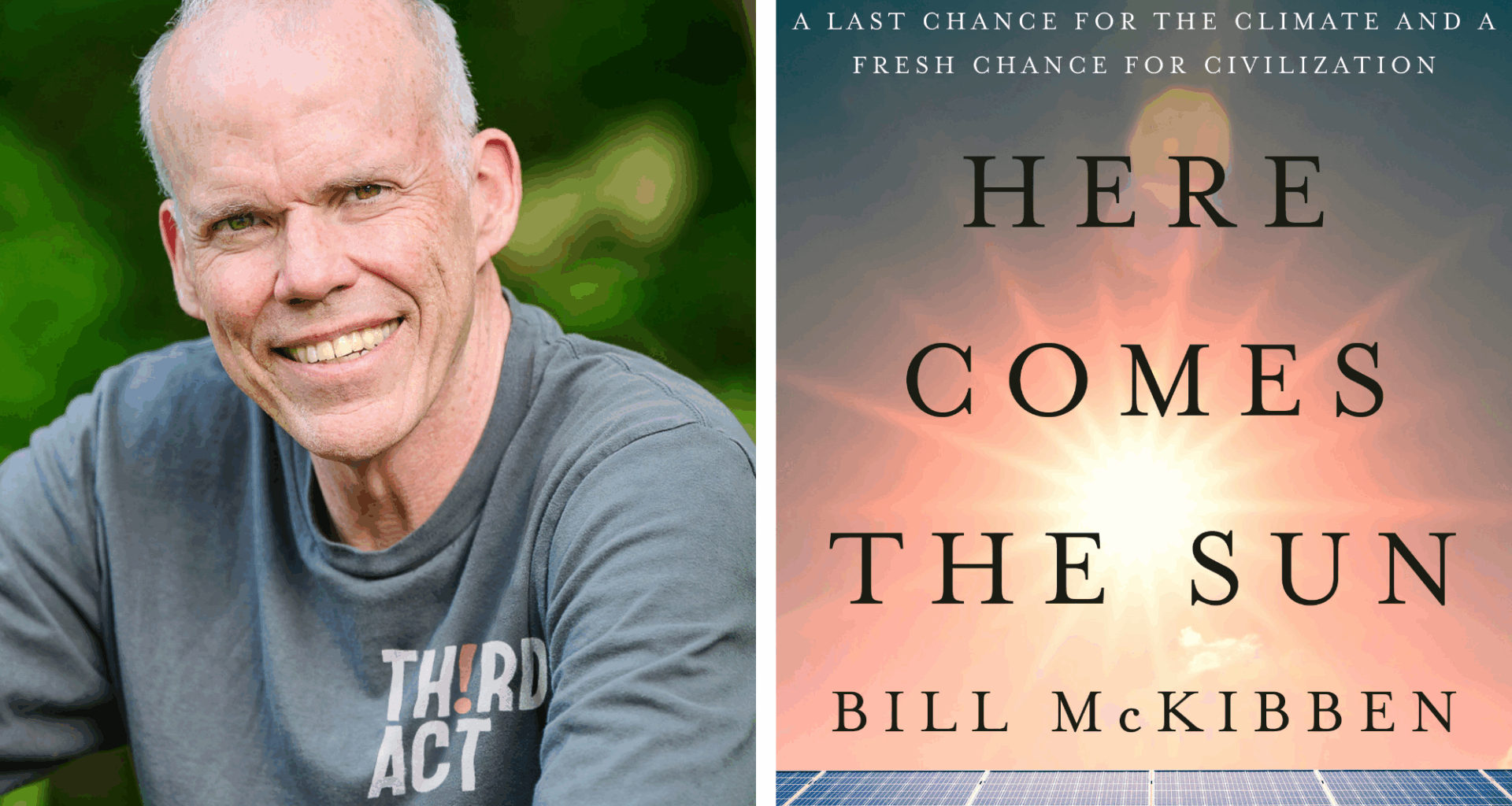 Bill McKibben and his new book “Here Comes the Sun” (W.W. Norton 2025). Photo by Storyworkz
Bill McKibben and his new book “Here Comes the Sun” (W.W. Norton 2025). Photo by Storyworkz
The Vermont Conversation with David Goodman is a VTDigger podcast that features in-depth interviews on local and national issues. Listen below and subscribe for free on Apple Podcasts, Spotify or wherever you get podcasts.
Bill McKibben is one of the world’s leading writers and organizers on the issue of climate change. He admits that his message about the perils of a warming planet can leave some people in despair. Now, with the U.S. at an authoritarian tipping point, McKibben has chosen an improbable time to offer hope.
McKibben has a new book, “Here Comes the Sun: A Last Chance for the Climate and a Fresh Chance for Civilization.” He takes readers on a far-flung journey to show how solar and wind energy have suddenly become the cheapest power in the world. People are installing solar panels equivalent to a coal-fired power plant every 18 hours. This is the fastest energy transition in history — and it may just help save democracy.
“There is one big good thing happening on planet Earth and it’s so big and so good that it actually has the capacity to help not only with the overwhelming climate crisis, but also with the crisis of inequality and of democracy that we’re facing now,” McKibben told The Vermont Conversation. “That one big thing is this sudden surge of clean energy, especially from the sun, that over the last 36 months, has begun to really rewrite what power means on planet Earth.”
McKibben explained that what used to be called “alternative energy” is now mainstream. “Four years ago or so we passed some invisible line where it became cheaper to produce power from the sun and the wind than from burning things. And that’s a completely epochal moment. Most days, California is generating more than 100% of its power for long stretches from renewable energy.”
“Here’s a statistic just to stick in your mind that will give you hope, too,” he offered. “A single boatload of solar panels coming from someplace like China will, over the course of its lifetime, produce 500 times as much energy as that same ship filled with coal. We’re not talking about a slightly better version of what we have now. We’re talking about a very different world.”
McKibben is currently spearheading Sun Day, which will take place on Sept. 21, 2025. It will be a global day of action celebrating solar and wind power and the movement to leave fossil fuels behind.
“Think about what the foreign policy, the geopolitics of planet Earth would have looked like in the last 70 years if oil was not a valuable commodity,” he said. “Human beings are extremely good at figuring out how to start wars, but figuring out how to start one over sunshine is going to be a trick.”
Vermont is already feeling the impact of this energy shift. “The biggest single power plant in Vermont is now the collection of batteries that Green Mountain Power has helped people put in their basements and garages and that they can call on in time of need to provide power,” he said
Bill McKibben is the author of over 20 books and a regular contributor to The New Yorker, the New York Times, and his Substack, The Crucial Years. He is the Schumann Distinguished Scholar in Environmental Studies at Middlebury College. He has won the Gandhi Peace Prize and the Right Livelihood Award, known as the alternative Nobel Prize.
Alongside his writing, the Ripton resident has founded the global grassroots climate action group 350.org, and Third Act, a political movement of people over 60 to use their “unparalleled generational power to safeguard our climate and democracy.” The organization now boasts some 70,000 members.
As the country and world teeter on a precipice, what gives McKibben hope?
“Just that we’re still here and fighting and that we have this new tool. It’s like a Hollywood movie: the bad stuff is happening all around us and here’s this new force riding to the rescue over the hills carrying not carbines and repeater rifles but carrying solar panels and lithium ion batteries.”


